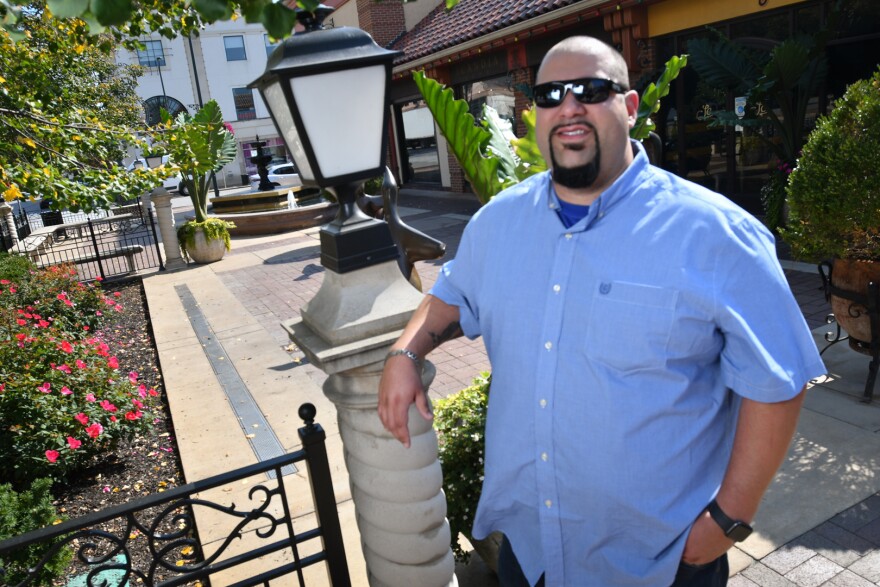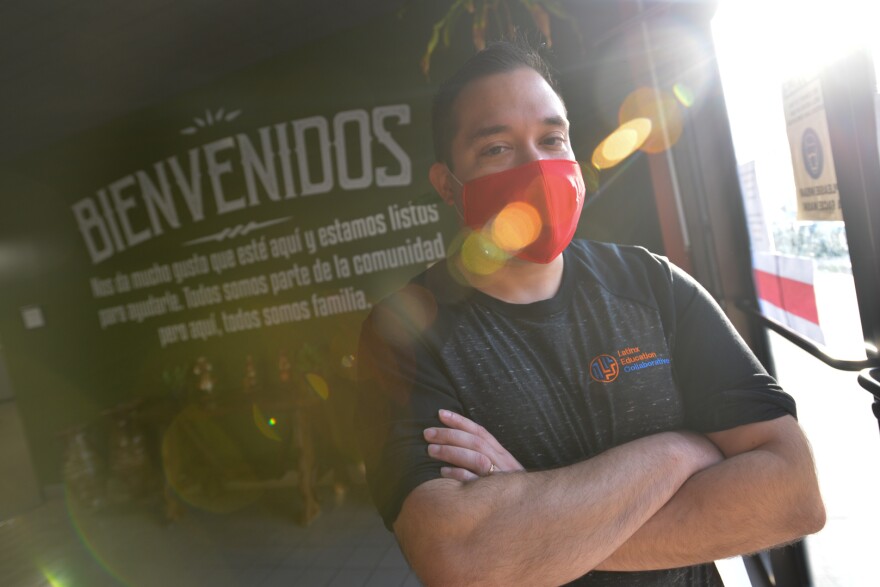Edgar Palacios has a clear message for politicians: If you want to reach young Latino voters in the 2020 election, you need to know they don’t just care about immigration. They want to hear what you’ll do about climate change, about college debt, about the job market. They’re not all Democrats, either.
“We come from 31, 32 different countries, we are both liberal and conservative, both religious and areligious,” said Palacios, a 34-year-old who lives in Kansas City, Missouri, “… so one message is not going to prevail through the majority of our community.”
He should know. He works with a lot of young people through his nonprofit, the Latinx Education Collaborative, which is dedicated to placing Latinx educators in K-12 schools. And he’s excited to see the passion in the area’s first-time Latino voters, who are joining advocacy groups, disseminating bilingual information on the voting process and helping out with voter registration drives at libraries and city halls.
“A lot of what I’m hearing from younger folks is that it’s a very critical election, one that will have generational consequences so I see a lot of activity, a lot of energy around this vote,” he said. “I suspect we’ll have a higher turnout than expected from our community.”
Latinos are projected to be the biggest non-white voter group in the Nov. 3 election, making up a record 32 million people. Within that group, young voters have the most potential power; every 30 seconds, a Latino or Latina will turn 18, according to an analysis of Census data by PRI’s The World.
Only about 11% of eligible voters in the congressional districts in the Kansas City metro identify as Latino — a minute number when compared to hubs in Texas, Florida and California. Candidates and campaigns show up where they get the most bang for their buck, and that’s not in the predictably red states like Kansas and Missouri.
“Newer, less likely or infrequent voters are not talked to as much,” said Jared Nordlund, who is a field director for UnidosUS, the national non partisan advocacy group for the Latino/Lataina population. “A campaign of any size has a finite budget and they’re going to spend their money on the voter they are most likely to persuade.”
But the under 40 demographic here is undeterred, seeing their communities disproportionately affected by the pandemic and the presidential and congressional candidates proposing very different approaches to the economy and immigration. They’re looking to get out the vote with Instagram stories, Twitter threads and TikTok.
The DACA vote
Wendy Aguayo, 22, came to the United States from Mexico with her parents when she was eight. They had work visas, but they stayed illegally when those expired.
Aguayo was granted DACA status (Deferred Action for Childhood Arrivals), and finished high school and went to college in Omaha, where she studied special education. She has a work permit now and a job at the Guadalupe Centers in Kansas City, Missouri, as a paraprofessional and translator.
But she and her family won’t go back to Mexico. Under current law, they may not be allowed to re-enter the United States. And while current DACA recipients are able to renew their status, a move that came after the U.S. Supreme Court blocked President Donald Trump’s effort to end the DACA program this summer, no new DACA applications are being accepted.
Aguayo, petite and soft-spoken, said most of her friends are still DACA recipients. They can’t vote. But they are hyper-determined to encourage others to do so.
“Being a DACA recipient, it makes them feel a little less, like they have less of a voice,” she said. “But I feel like they are using a lot more voice than the people who are citizens.”
But there’s a problem: Aguayo said organizers need to reach out to young voters where they are — on social media. Her peers don’t consume traditional news sources anymore; it’s “old news.” They seek out political information and share content from Instagram, Twitter and TikTok. Even Facebook, she says, is for older people.
“So if you’re using the same platform, and looking at someone who is sharing information and they’re just like you, you’re more willing to reshare that and follow their path,” she said.
Aguayo’s outreach efforts are working: Her boyfriend is now registered to vote, and she’s encouraging all of her friends who are citizens to do the same.
“It’s important,” she said. “If they can do it, you should. If I could do it, I would.”

First-timers
Palacios, who was born in Miami to Nicaraguan immigrants, came to Kansas City in 2004. His nonprofit is focused on making sure Latino students see teachers who look more like them in their classrooms. It helps combat misconceptions about the community that lead to stereotypes, even when it comes to politics.
Palacio said there’s hope in high turnout among young Latino voters this year, but barriers remain.
One is the “invisibility factor.” Registering to vote, acquiring mail-in or absentee ballots or even simply asking questions can put parents, aunts and uncles at risk. In the last few election cycles, news outlets have linked low Latino turnout to a variety of voter suppression tactics, like rigid voter-ID requirements and limiting the number of polling places.
After 2018, election watchers forecasted another record turnout in 2020 from the Latinx communities. But the vast majority of those prospective voters live in a handful of battleground states.
Alexandra Johnson, the president of the Missouri Hispanic Bar, said there’s a lot of confusion among Latino voters about the voting process, which she believes is by design, again to suppress the vote.
“My goal is for the Hispanic community to flex its muscle. We have enormous power,” Johnson said. “There may be some regions that don’t have many Latinx voters, but most have enough Latinx population that we could make a significant difference.”
Palacio knows there are fears that make participation feel not worth it. That’s why he sees it as his responsibility to remind first time voters how important their voices are.
“I remember being 18 and going to my first election in 2004 and not understanding the consequences of my vote,” he said. “And so I think it’s important for this generation, particularly for first time voters and young voters to understand that their voting will have lifelong consequences. Period.”

Conservatives belong, too
Not everyone in the metro area’s Latino community is eager to talk about how they’ll participate in this year's election for a different reason.
It is difficult to get local data on the party breakdown here, but nationwide, polling shows about one-third of Latino voters are Republican. Thirty percent say they approve of Trump’s performance and 23% say they “approve strongly.”
Rene Martinez, 36, said Trump comes closest to his libertarian views: limited government, states’ rights and religious freedom.
Martinez, who is a manager at a facilities operations company in the Kansas City metro and hosts a wrestling podcast, acknowledges he has issues with Trump’s inelegant social media and speaking style.
But Martinez has a radically different attitude than most of his community when it comes to immigration policies.
“Even though my parents immigrated here illegally, and I’ve heard people say (I’m) speaking from both sides of the argument. Well, yeah, because I’ve been on both sides of the argument!” Martinez said. “But I genuinely believe the administration’s issues aren’t with legal immigrants. I think they have been, and rightfully so, very, very tough on illegal immigration. “
Martinez knows he’s in the minority in the Latino community. But he also knows he’s not alone.
“When I go to the bakery, people know that I’m bilingual and will engage in conversation with me. They’ll give me the old wink, and kind of do that thing,” he said, slyly smiling while waving his finger back and forth as if to say “you and I get it.”
At 6-foot-1 and almost 300 pounds, Martinez said he doesn’t worry about violent pushback from anyone, but is concerned about his kids being bullied. His son came home one day, and told him he overheard classmates whispering that their dad supports Trump.
“We’re classified in many cases like a ‘bootlicker’ or ‘sellout,’ right, and that’s tough,” Martinez said. “When the president talks about the ‘silent majority,’ I think it’s people just like me, who don’t want to be ostracized by their community. We tend to stay quiet. We don’t want to be cancelled.”
I ask him how many others in the Kansas City Latino community share his views. “Many, many, many, many, many,” he said.


